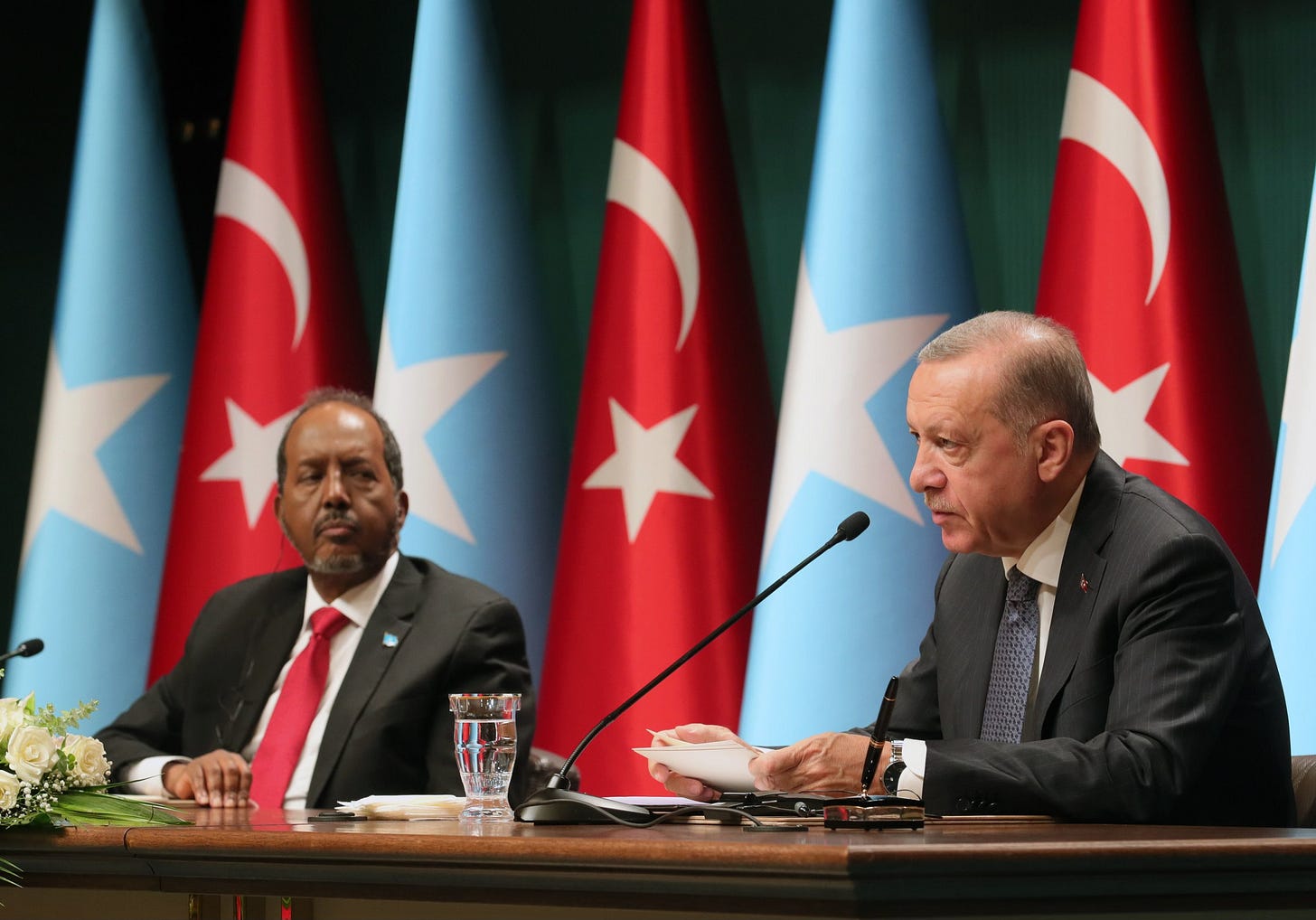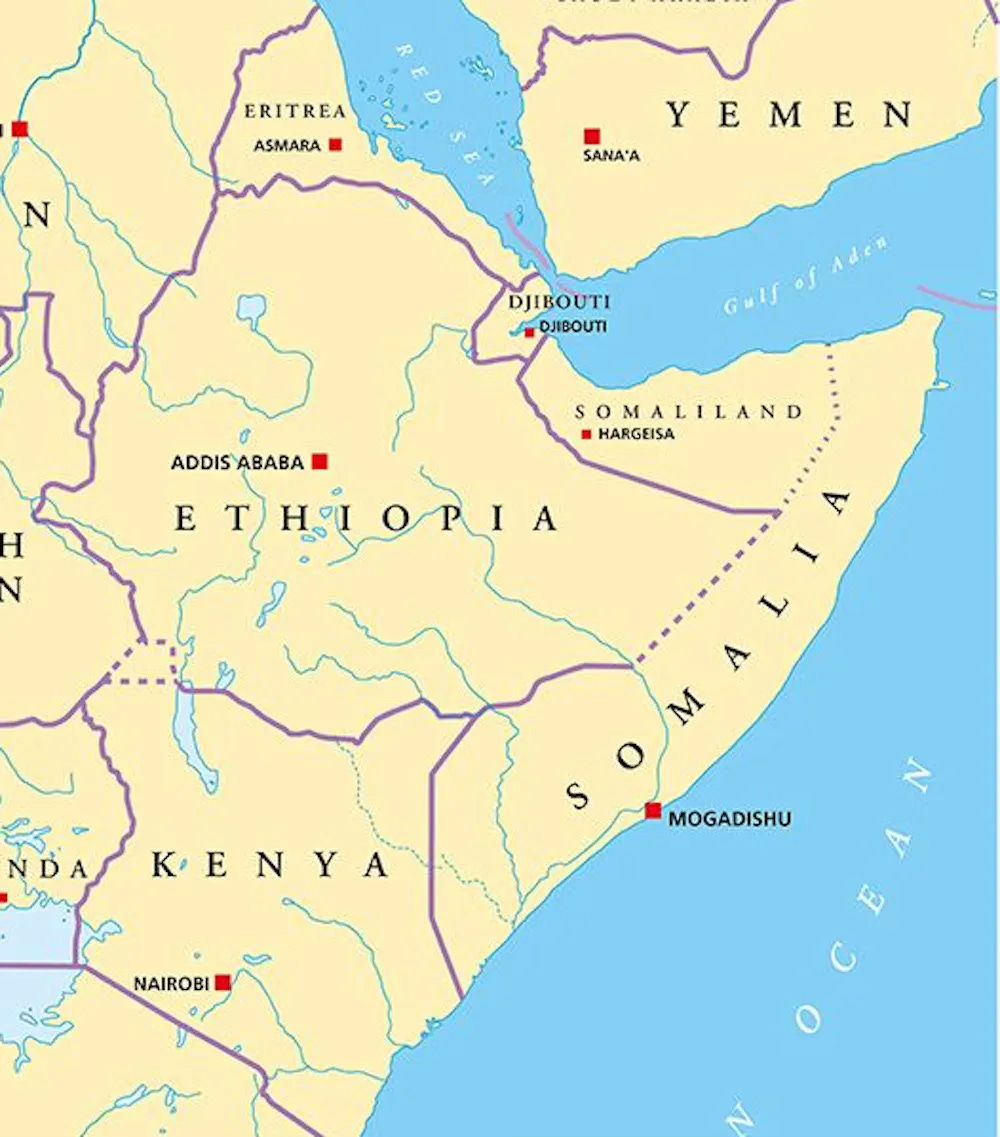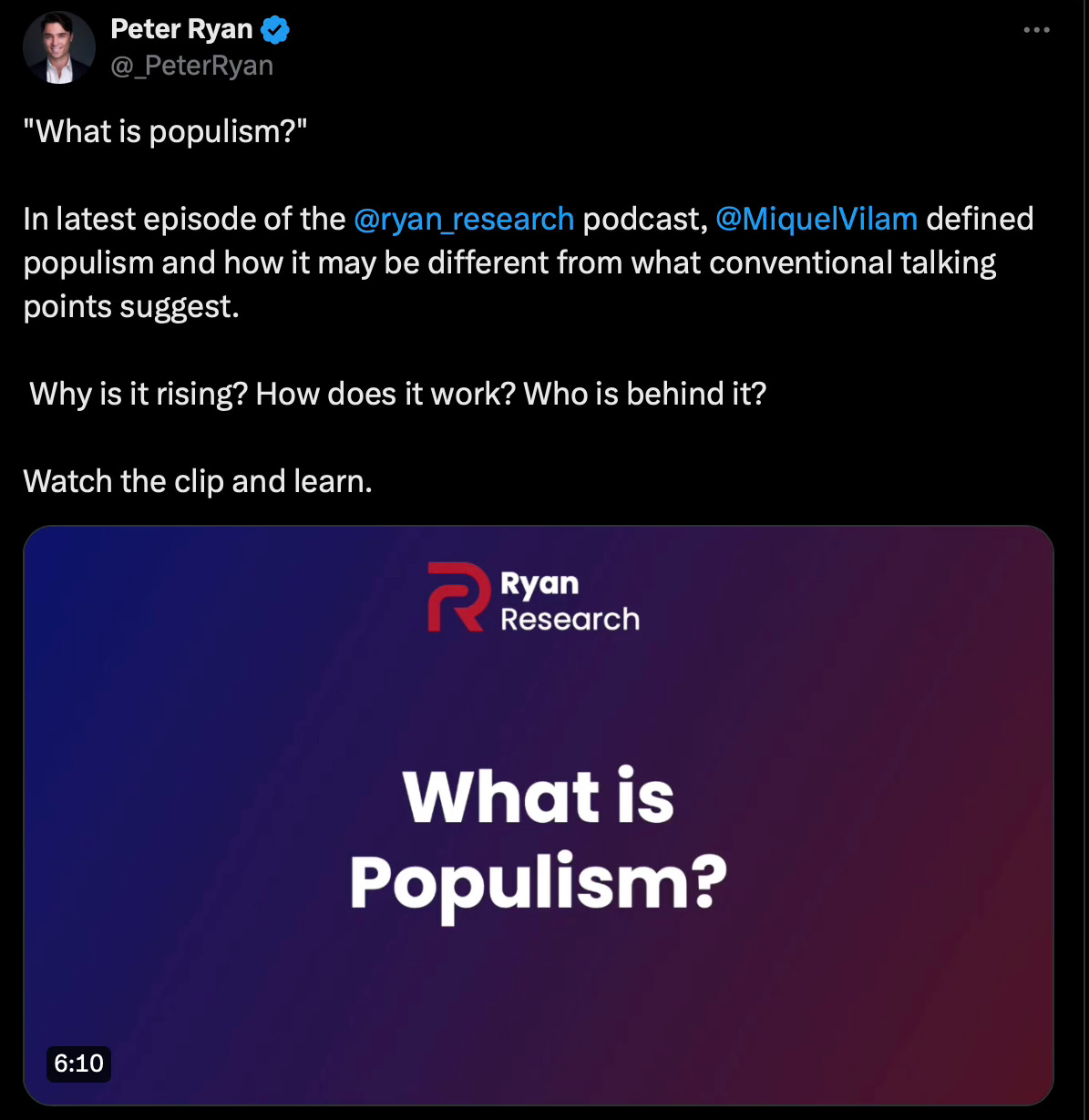Erdogan in the Horn of Africa BoP Brief #10
Erdogan in Somalia. A conversation with Peter Ryan. Does Xi's China have a good story? My new book is out!!
Turkey expands its influence in the Horn of Africa
Turkey and Somalia signed an oil and gas exploration and drilling deal targeting hydrocarbon reserves in Somalia's exclusive economic zone, which hasn’t been developed since the collapse of the Somali government in the early 1990s.
The numbers:
Estimates suggest Somalia may have at least 30 billion barrels of oil and gas reserves, requiring investments that could take three to five years.
The deal could potentially involve Turkey spending up to $500 million for exploration and successful drilling operations in Somali waters, with further development estimated to cost at least a few billion dollars.
Turkish President Recep Tayyip Erdogan's administration has invested over $1 billion in humanitarian aid to Somalia since 2011, establishing the largest Turkish embassy in Mogadishu and training more than 16,000 Somali soldiers.
The geopolitics of the Horn of Africa
On top of that, this deal on oil prospecting has also been accompanied by a security treaty between Ankara and Mogadishu. That is relevant in itself. However, things take another tone if we add that Somalia already had a security treaty with one of Turkey’s rivals in the Muslim world, the UAE.
Erdogan eyed a security treaty with Somalia before the past elections. However, the Turkish opposition made clear that they didn’t want to maintain Erdogan’s ambitious foreign policy. Somalis believed Erdogan might be out, so they turned to the UAE as their security guarantor.
However, Erdogan's reelection – which surprised many but not me – altered Somalia's options. Turkey could be brought back on board to counterbalance potential Ethiopian threats due to its military presence and anti-piracy efforts.
Here, I would like to remind you that Ethiopia recently signed a memorandum of understanding with Somaliland to gain access to the Red Sea. That was a historic agreement for both sides. Ethiopia fought a thirty-year-long war to preserve its coastline and gain access to the sea with Somalia and Eritrea when it seceded.
For Somaliland, this means a tacit recognition as the legitimate sovereign over its territory, but for Somalia, that is a violation of its territorial integrity. Given the country's weakness, Somalia needs something to back them in case they would like to take action against Somaliland or further external and internal threats.
But if the drums of war began to beat in the region, Erdogan might be playing a risky game.
Erdogan’s great game.
If we put this in a broader perspective, taking into account the Red Sea Crisis, Turkey securing a partnership with Somalia is strengthening its position in one of the most strategic global geopolitical shock points.
Erdogan’s standing in the Muslim world has improved thanks to his strong support of Palestine, which has rebalanced Turkey’s position vis-a-vis Iran, Saudi Arabia, and the Gulf States.
Although all Eastern Mediterranean nations, Turkey is suffering from the disruptions in the Red Sea, but Erdogan has remained supportive of the Houthis.
For example, Erdogan has not only refused to join NATO allies missions but has also criticized the US and Britain for attacking Houthi positions in Yemen. Besides, Turkey is an essential financial hub for the transfer of funds to support Houthi operations.
With a rather friendly tone with the Houthis and with the Turkish navy already involved in anti-piracy missions in Somalia. Cementing its position in Somalia, Erdogan is setting a firm foot in the region.
Bottom line:
The security and energy deal with Somalia serves Erdogan’s long-term geopolitical goals: expand its influence in Africa and the post-Ottoman space and Tukey’s role as an energy hub.
Conversation with Peter Ryan: Multipolarity, Industrial Policy and Populism
Peter Ryan invited me to the Ryan Research podcast to discuss the connections between geopolitical change and the rise of multipolarity, the resurgence of industrial policy in the West and the rise of populism.
Here is a clip of our conversation about Populism:
And you can listen to the whole conversation in here:
And don’t forget to subscribe to his podcast!
Is China telling the China story right?
It is March, which means it is Two Sessions.
For those who have lived in Beijing, this is the time of the year when the sky is always clear, pollution disappears, and your VPN doesn’t work very well.
The "Two Sessions" is the annual meetings of the National People's Congress (NPC), the legislative body of the PRC, and the Chinese People's Political Consultative Conference (CPPCC), an advisory body without legislative power but that to a certain extent serves to hear the opinions of selected citizens.
The Two Sessions is not interesting for the discussions on the legislation passed – which has already been agreed upon – but because it sets the agenda for China's political and economic direction for the coming year.
This year, the Chinese government set ambitious goals given the current economic situation: a 5% GDP growth target. It is unclear how China will meet that target without a stimulus trying to combat deflation and doubling down on industrial policy all at once.
With the horizon of a potential conflict in mind, it seems that for Xi, securing industrial capacity takes precedence over stimulating domestic demand.
China’s PR problem
Nevertheless, another interesting element that we have seen during the Two Sessions is the acknowledgment by Chinese authorities that China has a PR problem.
This is not new, but things now have gotten worse, and that seems to have been a relevant topic of discussion in the CPPCC – at the end of the day, is one of the most important organizations of the United Front, and expanding the CCP message is part of their function.
For example, the decision to scrap the traditional news conference during the Two Sessions had a much more symbolic impact than whatever real value in terms of transparency could come out of it.
Less willingness to provide information brings more policy uncertainty, and that not only harms China’s diplomatic capacity but also impacts the trust investors can have in the country.
The Chinese scholar Jia Qingguo, who was part of the CPPCC, talks about this problem in a recent article translated by Zichen Wang in Pekingnology:
the favorable perception of China among the populace of some countries has not increased but decreased. A Pew survey conducted last year revealed that in many countries surveyed, negative views of China reached a 20-year peak, with significant declines in countries around China, such as Japan, South Korea, and India.
Some may argue that this is a problem of the West and that the “Global South“ loves China. One thing might be its leaders, but for example, this is not the case, in countries like Mexico, Brazil, or Argentina, which have had governments friendly to Beijing.
Jia Qingguo also points out the dramatic decrease in people-to-people exchanges due to COVID-19, especially in the academic world due to raising concerns about academic freedom and potential consequences of sensitive research:
3. Academic research: Issues such as the emphasis on political correctness in the anonymous review process for master's and doctoral theses increase the uncertainty for foreign students with different political and cultural backgrounds. Additionally, the absence of implementation details following the introduction of some laws concerning foreign affairs leads to confusion. For example, the recently introduced Anti-Espionage Law still lacks detailed implementation guidelines, leaving unclear what information collection and methods do not constitute a violation, leading to misunderstandings externally.
Eliminate concerns about academic research. Consider conducting separate anonymous reviews for the theses of foreign students, using adherence to the Chinese constitution and laws as the standard for political judgment.
But what does Wang Huning, the person presumably in charge of creating the China story, say about these problems?
He mentioned some ideas in his speech during the opening of the CPPCC to address this issue. You can find parts of it translated by Manoj Kewalramani for Tracking People’s Daily:
In his review of 2023’s work of the CPPCC, he mentions:
He also says that a “special consultation meeting on ‘Enhancing the Spread and Influence of Chinese Civilization’ was held to provide research and suggestions on the protection, inheritance and promotion of China's excellent traditional culture, the construction of an all-media communication system, the development of the digital cultural industry, and strengthening the integration of culture and tourism to serve the construction of a cultural power.” 召开“增强中华文明传播力影响力”专题协商会,就保护传承弘扬中华优秀传统文化、全媒体传播体系建设、数字文化产业发展、加强文旅融合等调研建言,服务文化强国建设。
In other parts of the speech, he also mentions part of the work the CPPCC has done to engage foreign institutions or think tanks.
We can see that in Wang Huning’s speech, there are indeed concerns about the need to tell China, but it doesn’t seem that there is much guidance on how that should be told; beyond that, it should be told according to the party line.
However, something worth paying attention to is the emphasis on the idea of Chinese Civilization. Although talk about China’s civilization has always been around, it now seems to be taking much more centrality on China’s international discourse to stress the difference from the West.
Next China will still be China
That relates to Wang Yi’s words, China's top foreign relations official, during the Two Sessions, using a relatively new slogan, “Next China will still be China, (下一个中国还是中国), that Xi already used during his visit to San Francisco during the APEC Summit.
The catchphrase can be seen under civilizational exceptionalist lenses. We could understand it as, despite modernization, China is going to remain true to its civilizational values and unique character.
However, we can also interpret this catchphrase through a much shorter temporal frame, conveying an economic message: despite current hardships, China is still the center of global manufacturing. That is to say, the China of quasi-miraculous economic growth that everyone had in mind during the 2010s hasn’t ended.
As Manya Koetse says on What’s On Weibo, the catchphrase could imply that neither India nor Vietnam is going to be the next China. Only China is going to be the next China.
However, although this may serve to ease worries about economic woes, I can’t fail to notice a taste of nostalgia for this framing. Trying to make foreign audiences think more about the China of ten or twenty years ago than the one of today.
The important question here is not only “Is China telling its story right?” But more importantly, does the post-Reform and Opening Up China era have the right story to tell?
My book: The End of the Chinese Alternative
And that’s precisely something I explore in my new book, The End of the Chinese Alternative [Original: La fi de l’alternative xinesa].
I am tremendously happy to share with you that I have published my first book, which condenses the work of years of research and thinking about China’s contemporary history.
The book explores how China has built its version of modernity and how, at present, China once has reached a late stage of development, along with the rest of thing a point where no one has really figured world, is enter out what to do.
China hasn’t found an alternative to deal with the problems of technological and digital societies, and despite the political distance, Chinese society increasingly finds itself dealing with problems similar to those of Western societies.
For now, the book is in Catalan, but I will talk more about its contents in the future and translate some fragments. And maybe I’ll work on an English translation down the line at some point. Don’t have any doubts, this is not the last time you will read about my book.
Those of you privileged with knowledge of the Catalan language can find it in bookstores in Catalonia from March 18th onwards or online here.
I am sure will make a great (self?)present for Sant Jordi!
This is all for this week; I hope you like it. As always, likes, comments, and shares will be appreciated.
Miquel










1: ¿How do you see the chances of a conflict in Ethiopia (or near by) in a short-middle future?
I say it, because taking a look inside the country we can see a lot of conflicts and an increase (or at least, not expected decrease after war) of violence from ethnics groups. The killings are frequent, and the support of the amharics armed groups hat helped the government in the previous war has been lost. Now, even this groups has taken a position against the central government and are added to the already existents. Also, the porblem of food stills on the country and it is huge and terrible, especially, in the Tigray region, that is not in peace and could experience a reflorishment of conflict. The transports and logistics are been affected, for what I know, there are kidnappings, thiefs and roads thare not been used. In relation with this and knowing a bit about Africa, is not weird or catastrophistic to think of a transfer of the militar state personal to those groups, or maybe the adoption of certain practices like extorsion, pression, etc... that later can increase to something else.
Also, and maybe because all of this, the government is being critized, especially on the regions. We must remember that the "emergency state" is keep ruling.
Also, if we take a look outside, we can see the neighbours in Sudan (where,I think, the United Arab Emirates are also smelling) and the civil war. We can remember all the issues with the Renaissence Dam and the hostility with Sudan and Egypt about it. Finally, the attempt for find a open way to the sea has created the conflict with Somalia, that has provocated a reject from the african countries, and now the support of a big player in the game like Turkey (if we look the religious sphere of the issue, we can see and isolated Ethiopia).
Honestly, I don't know how to look this, because I understansd the needs of sea acces for the country if wants to grow, but looking the internal situation is to add a new "enemy and problem" to the current state of things. However, knowing how the mind of politics works, it is probable that an external goal and threat (both) could distract or cohesion (both) the population.
2: Regarding to China, I ask you: ¿those needs of public relations are directed to who, and why?
I understand that China is interested in open the eyes to the western population that are being manipulated and think that China is the evil, in order to avoid the predictable intentions of the United States in the region: making of Taiwan a new Ukraine in order to damage China. I mean, probably they want to improve their image in order that create a possible oposition of the population of this western countries when the more belicist and anti-chinese try to mobilize the population.
I also can be a version of this directed to the population of the neighbour conuntrys that could be also influenced by the same message.
Further from this, I can not see any other "target" from these improve of public relations. I mean, a part from the need of every institution of selling and give a good image from itself. Because chinese knows how to use diplomacy and business, and the countries of the Global South, like the businessman, know that their relation is build on interest, and they don't need to like each other, just take profit and benefit.
That make me think that is a need for counterfact the attacs to China image that come from our part of the world, like the armamentistic grow for a country after another did the same.
All of this, of course, asuming that we talk from and improve of publir relation directed to outside China.
Thanks, and sorry for my english, I've made my best.